Cocoa butter by rail: even sensitive and temperature-controlled goods are suitable for rail transport, as the successful collaboration between Kombiverkehr and Lettl Transporte shows.
Whether in the shape of a Father Christmas, a bunny, a heart or a chocolate bar – you can always give chocolate as a gift, with or without an occasion. After all, there are plenty of people with a sweet tooth who enjoy them to the full. Chocolate logistics can also be realised to the full, as the example of Lettl Transporte from Wasserburg am Inn (Rosenheim district) shows. The freight forwarder specialises in the transport and logistics of liquid foodstuffs in tank containers. The company maintains a fleet of around 100 lorries, 120 food trailers and 30 containers for this purpose. The latter are also suitable for combined transport. Lettl transports cocoa butter – one of the essential ingredients for chocolate – intermodally by rail and road in these loading units.
Managing Director Stephan Lettl can identify with the product – as he himself has a sweet tooth, as he admits. His company has been transporting the chocolate precursor on the Kombiverkehr connection between the Ludwigshafen combined transport terminal (KTL) and the DUSS terminal in Munich-Riem for several years. The train currently runs five times a week at night. “We have established a regular service here and use the Kombiverkehr service almost every day,” says Stephan Lettl, who is the fourth generation to run the company with his brother Martin Lettl. Within two to three weeks, there are usually 10 to 15 containers travelling on this route for Lettl Transport.
Sophisticated logistics concept on the railway
“We very much welcome the fact that customers like Lettl Transport also transport sensitive goods such as liquid foodstuffs by rail,” says Frank Werner, Manager National Transport at Kombiverkehr. “The quality and deadline requirements are particularly high in this segment. The goods must be delivered to the recipient and processed on time.” According to Werner, Lettl Transport is one of a whole series of companies that have been transporting foodstuffs in intermodal transport for years – be it frozen food, meat or beverages.
We very much welcome the fact that customers like Lettl Transport also transport sensitive goods such as liquid foodstuffs by rail
Frank Werner, Sales, Manager National Transport
The example of cocoa butter is also noteworthy in another respect: in railway circles, it is often said that freight transport by rail is only of interest to customers over distances of 300 kilometres. Otherwise, the costs for pre-carriage and onward carriage as well as for transhipment at the two terminals are too high. The longer the distance, the more this factor is relativised. Although the distance between Ludwigshafen and Munich is almost 400 kilometres, it is not really a long distance. Nevertheless, both the chocolate factory and its logistics service provider have enjoyed short-distance rail transport for several years.
Four tonnes on top is real added value
A key reason for Lettl: the weight advantage of 44 tonnes in combined transport. “Even the short distance is fun,” emphasises the entrepreneur. The vehicles used are elaborately equipped for tank transport – with on-board pumps, pressurised tanks with hoses and heating units – and therefore weigh a lot. The payload is usually 25 tonnes for semi-trailers and 28 to 29 tonnes for containers. Four tonnes on top is therefore real added value. According to Stephan Lettl, the shortage of drivers will also speak in favour of rail transport in the future. “It doesn’t pose any problems for us yet,” he says. “But with the high average age of our employees, it will definitely become a problem.” This is where the use of rail could bring relief. Another driver for the railway: CO2 savings. The Lettl brothers are already thinking about purchasing electric lorries for the pre-carriage and onward carriage. “They would be an ideal complement to rail and the climate effects would be even greater,” says Lettl. However, he still sees limitations in terms of the range of electric lorries and the power supply for the charging infrastructure.
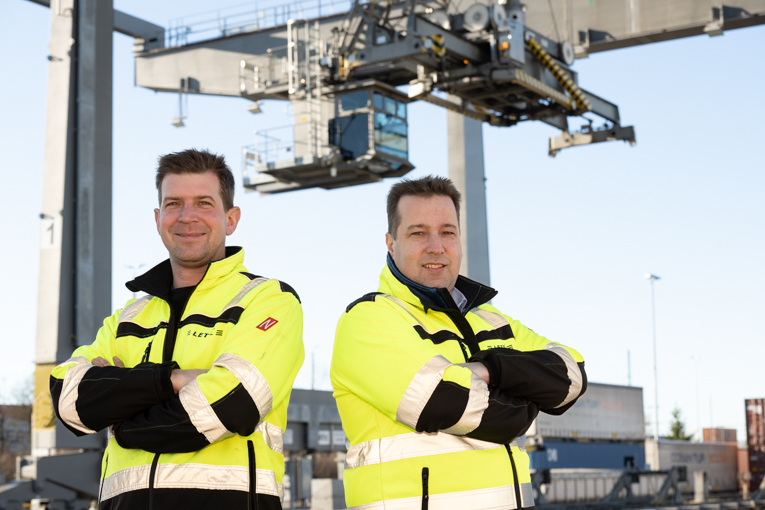
“With a weight advantage of 44 tonnes in combined transport, rail is also fun over short distances.”
Stephan Lettl, Managing Director Lettl Transporte (right), with his brother and Co-Managing Director Martin Lettl
Experience in combined transport since 2012
Incidentally, Lettl Transporte has been travelling by rail for some time. In 2012, the freight forwarder took over transport operations to and from the Munich-Riem intermodal terminal for a partner company. The next step was for the freight forwarder to hire containers in order to gain experience in main rail transport. The first journeys were from Benelux to Austria. Lettl still uses rail from Benelux to southern Germany today, but mostly only for overhangs. Shipping companies take the containers to Cologne-Eifeltor, for example, where they switch to rail and travel to Munich-Riem.
The bosses at Lettl Transporte could imagine more regular rail transport services. However, Stephan Lettl believes that the federal government would also have to do some homework and invest much more in the rail network and implement construction projects much faster, pointing to Switzerland as a role model, which realises rail projects much faster and creates capacity. “Most of our routes are at their limit.” He is glad that the Ludwigshafen-Munich axis is running smoothly. Otherwise the Easter bunny or the chocolate Father Christmas might arrive too late on the supermarket shelves.
About Lettl Transporte GmbH
His great-grandfather was called Stephan, as is the current boss: Stephan Lettl and his brother Martin are the fourth generation to run Lettl Transporte, which was founded in 1906. The company specialises in transporting liquid foodstuffs in trailers or containers. The haulage company from Wasserburg am Inn employs around 130 people. The fleet includes around 100 of its own lorries, mainly Mercedes-Benz, 120 food trailers from Feldbinder and G. Magyar and 30 tank containers from Van Hool in the Netherlands and Welfit Oddy in South Africa. The company runs tours for regular customers within Germany as well as to other European countries as far north as England and as far south-east as Serbia. All types of liquid foodstuffs and preliminary products are transported – whether beer, milk, juices, water or wine, cocoa butter, liquid sugar or oils.
Are you interested in our climate-friendly transport solutions within Germany? Your contact: Frank Werner, Sales, Manager National Transport, Phone +49 69/79505-212 or fwerner@kombiverkehr.de

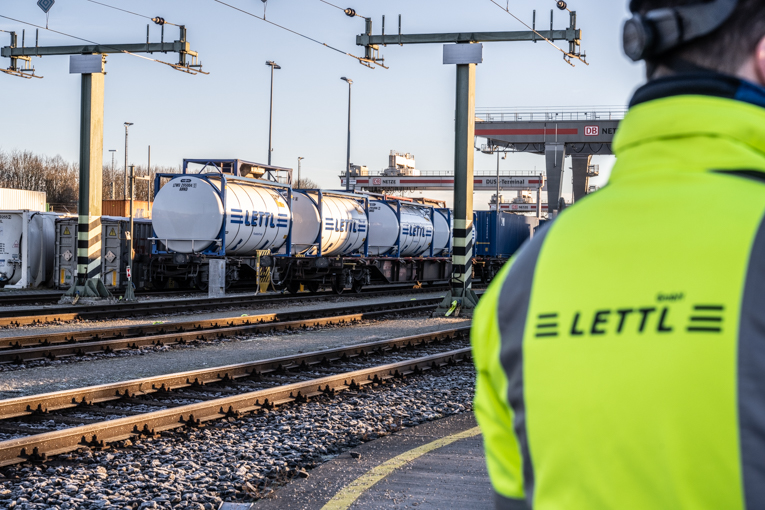
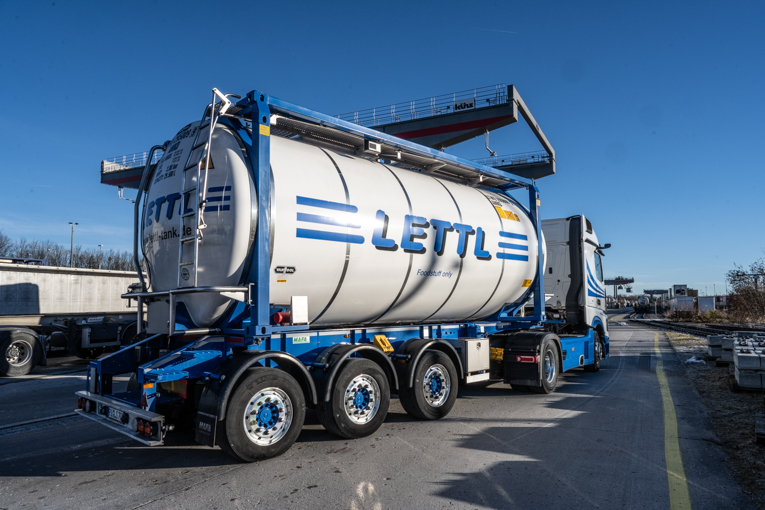
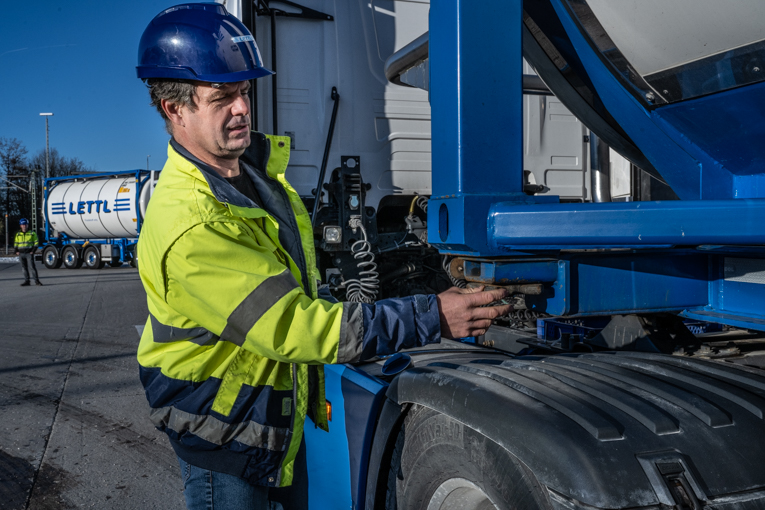
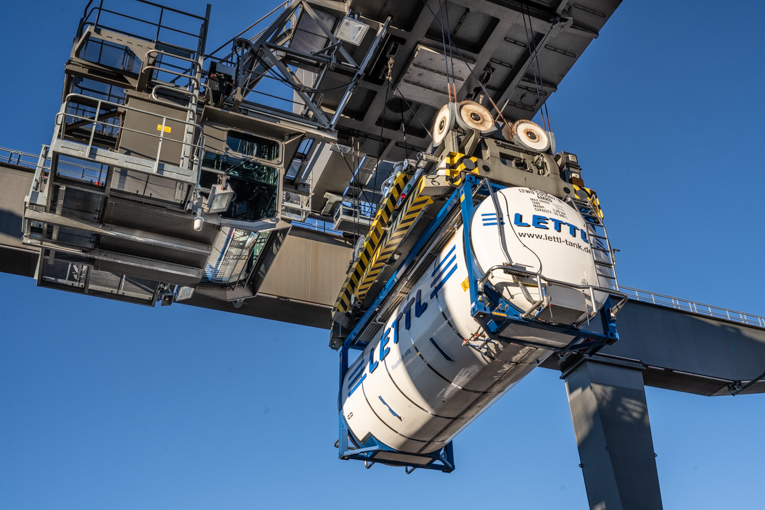
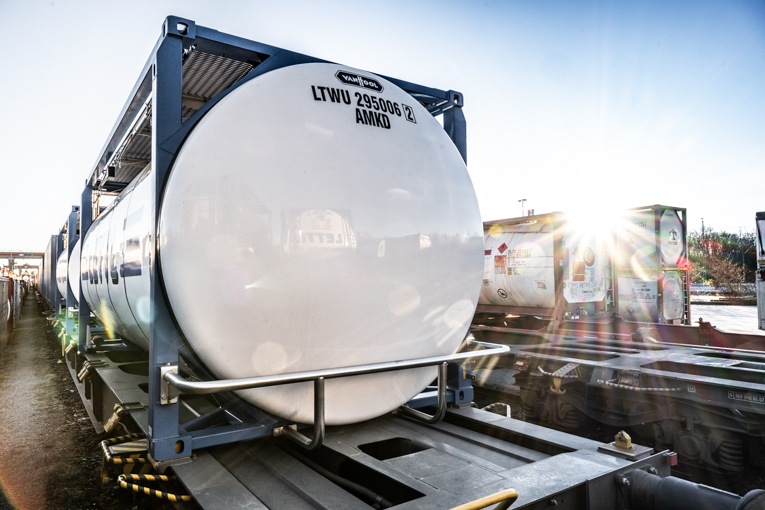
Comments are closed.